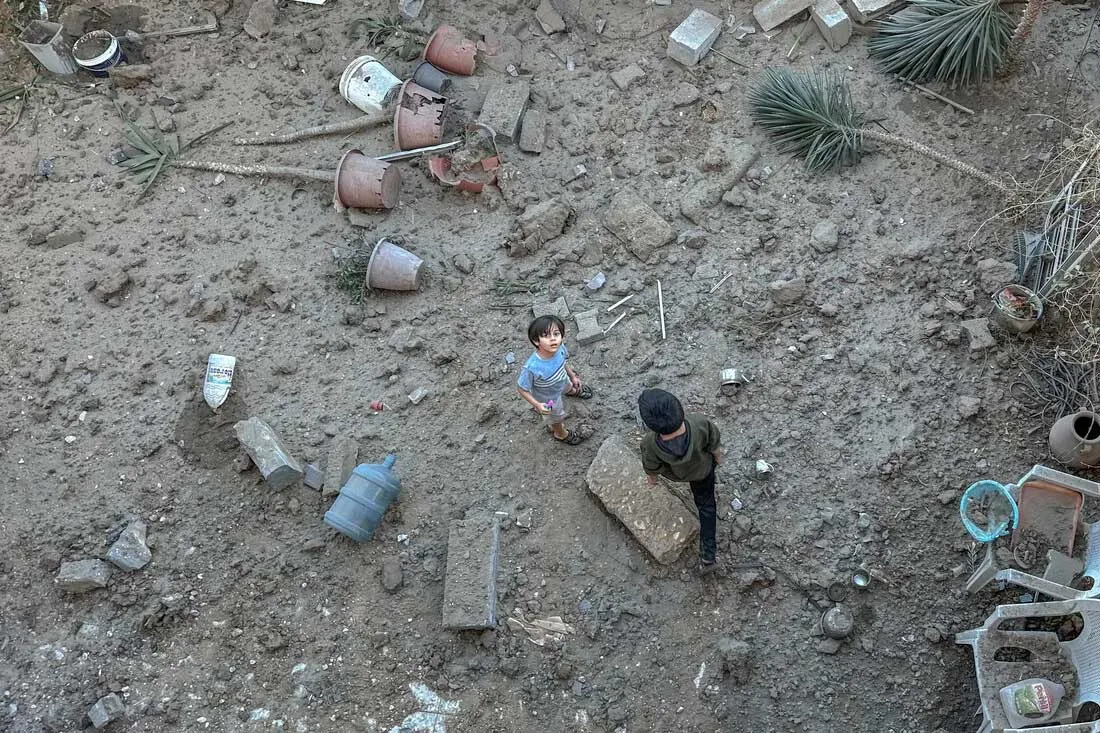January 31, 2024 – Almost four months after the October 7th attacks and the devastating conflict in Gaza, CARE warns that over two million Palestinians are at risk of dying of hunger and preventable diseases. Over 80% of the population is displaced, with many setting up makeshift shelters from salvaged material unable to protect children, pregnant women, and the elderly from current nighttime temperatures as low as 5 degrees, rain, and wind.
“Although people we speak to have survived the bombs so far, they are afraid of dying a slow death. They share small rooms or tents with dozens of others, and pregnant women lie on the cold floor without a mattress next to people they have never met before,” says Hiba Tibi, Acting Deputy Regional Director for the Middle East and North Africa. “People drink brackish water and eat whatever they can find on the dirty floor. Everyone is coughing, children have bloody diarrhea, and mothers stop eating to ensure their children are fed.”
Over 60% of homes in Gaza have been destroyed or severely damaged. 1.7 million people are internally displaced, seeking safety from the constant bombing and attacks in sheds, unfinished buildings, schools, hospitals, and other community buildings.
“The conditions are a living nightmare. People have no winter clothes, no blankets, nothing to keep their children warm. The floors are muddy as the rain keeps flooding the tents. The camps we work in have hardly any water, people are forced to defecate in the open as there are not enough toilets, and many are suffering from diarrhea,” says Tibi. “Families tell us they feel like living in a ‘death trap’ or ‘hell on earth’, with basic hygiene and safe conditions completely non-existent.”
The situation is particularly catastrophic in Rafah, where approximately 1 million Palestinians are crammed into an area of 65 km2 – less than half the size of Liechtenstein. With shelters already at over four times capacity and up to 480 people sharing just one toilet, diseases are placing lives at serious risk, especially for children. According to the World Health Organization, cases of diarrhea among children under five have increased by 2,000% since the start of the war, while over 225,600 people suffer from acute respiratory infections.
“This is a bad time of the year to have to live on the street or in substandard housing. The nights are cold, and it is raining. Children walk around in sandals and ripped shirts. The worsening shelter conditions, scarce fuel supply, and the use of hazardous materials for warmth are leading to serious health and environmental consequences,” says Tibi. “Mothers worry their children will die of hunger, hypothermia and diseases, even if they have so far survived the bombs.”
Lack of food, water, and sufficient vitamins further exacerbates the situation, as the whole population of Gaza, 2.2 million people, is at imminent risk of famine. On average, people in Gaza only have access to two to three litres of water per day, a fifth of what is the minimum needed for drinking, cooking, and personal hygiene in an emergency.
“CARE is particularly concerned about the situation of women and children. 90% of children in Gaza under two years are not eating a sufficiently diverse diet,” says Tibi. “Their immune systems are down, putting them at further risk of dying from otherwise preventable diseases. We increasingly hear of young mothers who are unable to breastfeed, as they are too malnourished and stressed from the impact of the war and blockade. We can only begin to imagine the catastrophic impact this war will have for years to come.”
CARE reiterates its calls for an immediate ceasefire that enables full, safe, and unhindered delivery of humanitarian assistance, access to shelter, healthcare, food, water, and other basic necessities of life for Palestinians throughout Gaza; and the release of all hostages. The international community must act swiftly to avert a deepening humanitarian catastrophe.
Notes to editors
CARE International has been operating in Gaza and the West Bank since 1948. Prior to the current conflict, we were supporting about 200,000 Palestinians in Gaza and we continue to support about 300,000 in the West Bank to meet basic food needs, improve farming and agriculture, empower women to earn an income, support women’s leadership, and improve health programs focused on gender-based violence, sexual and reproductive health, and children’s mental health.
Since the escalation of the conflict, the CARE team in Gaza and their partners were able to distribute hygiene kits, shelter items such as blankets and mattresses, and drinking water to over 91,000 vulnerable displaced people. CARE also reached over 60,000 people with medical support, including medications, medical supplies, and primary health services.
For media inquiries, please contact: usa.media@care.org

